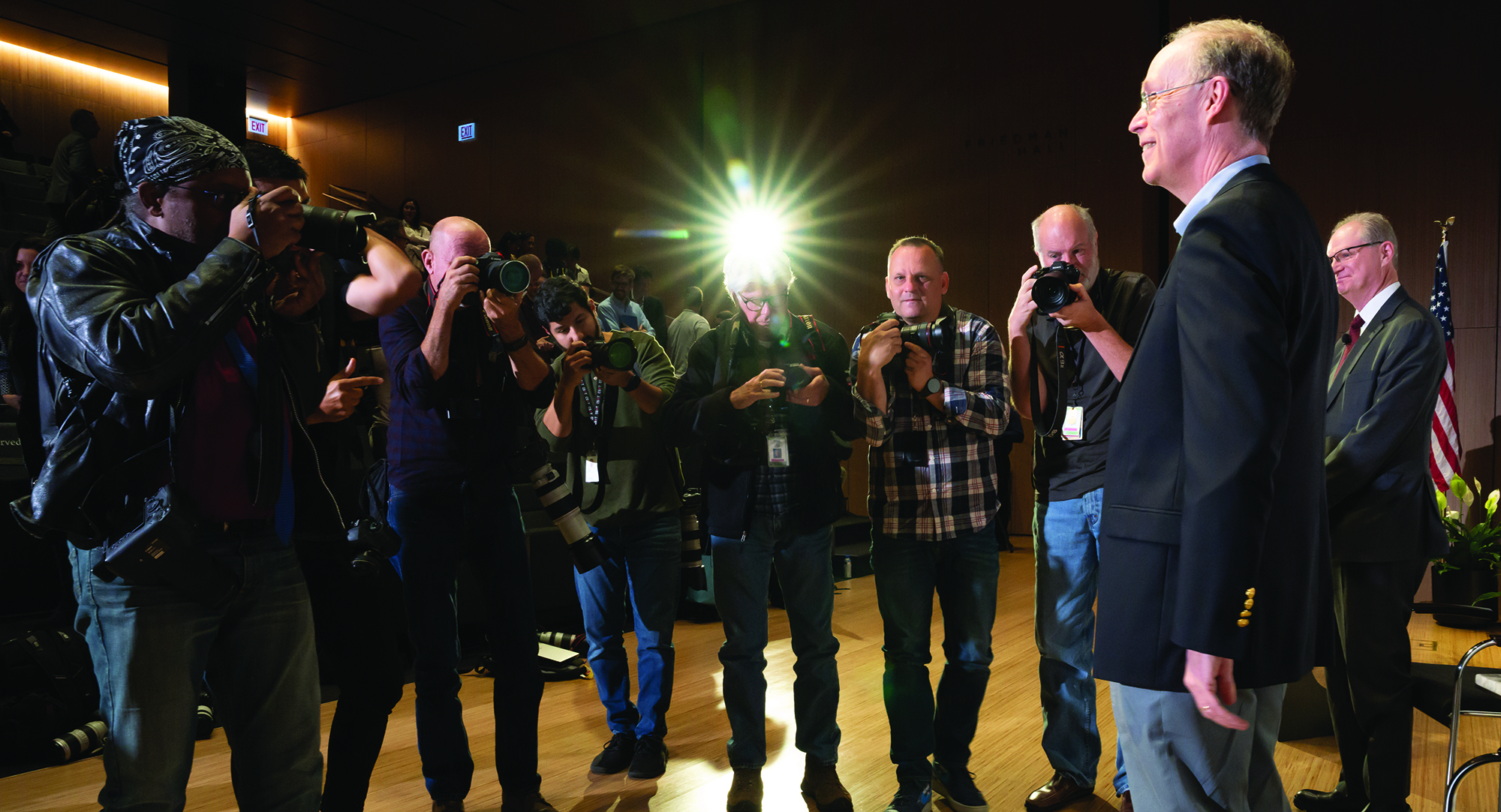
The man of the hour: Douglas W. Diamond (alongside University president Paul Alivisatos, AB’81, far right) surrounded by photographers at a press conference the day his Nobel win was announced. (Photography by Jason Smith)
Douglas W. Diamond’s banking research gave UChicago its 97th Nobel.
In October longtime faculty member Douglas W. Diamond was awarded the Sveriges Riksbank Prize in Economic Sciences in Memory of Alfred Nobel 2022. He shared the prize with Ben Bernanke of the Brookings Institution and Philip Dybvig of Washington University in St. Louis.
The Royal Swedish Academy of Sciences honored Diamond, the Merton H. Miller Distinguished Service Professor of Finance at the University of Chicago Booth School of Business, and the other economists for improving “our understanding of the role of banks in the economy, particularly during financial crises.” His pioneering research has changed the way people view banks and laid the groundwork for how central bankers, regulators, policy makers, and academics approach modern finance.
“Professor Diamond has made extraordinary contributions to the field of economics and our collective understanding of the role financial institutions play in society,” said University of Chicago president Paul Alivisatos, AB’81. “This is a well-deserved recognition of his groundbreaking scholarship.”
Diamond is the 97th scholar associated with the University to receive a Nobel Prize and the 33rd to receive the Nobel Memorial Prize in Economics. In addition to Diamond, seven current UChicago faculty members are laureates in economic sciences: Michael Kremer (who won in 2019); Richard Thaler (2017); Eugene Fama, MBA’63, PhD’64, and Lars Peter Hansen (2013); Roger Myerson (2007); James Heckman (2000); and Robert E. Lucas Jr., AB’59, PhD’64 (1995).
Diamond learned the news of his Nobel Memorial Prize win in the early hours of October 10. Though the call from Sweden was a surprise, he was saved from wondering if it was a prank because he knew two of the prize committee members well and recognized their voices. “I thought it was probably legit, but you never know,” he said. “I have some friends with a good sense of humor.”
Considered a founder of modern banking theory, Diamond is known for his research into financial intermediaries, financial crises, and liquidity. His research agenda for the past 40 years has been to explain what banks do, why they do it, and the consequences of these arrangements.
Introducing Diamond at a news conference, Chicago Booth dean Madhav Rajan said, “His groundbreaking ideas literally created modern banking theory. His work and insights have had global impact and truly transformed the way we think about banking.”
Among his most influential work is the Diamond-Dybvig model, which he codeveloped with Dybvig in “Bank Runs, Deposit Insurance, and Liquidity” in the Journal of Political Economy in 1983. The model clearly and concisely lays out the fundamental paradox for banks: They are repositories for consumers’ cash, but when banks make investments with that cash, it tends to tie up money so that it can’t be immediately liquidated. In normal times, this is a good way to create wealth, but it can lead to a crisis if everyone panics and tries to withdraw all their funds at the same time.
“[The system] is very vulnerable to the fear of fear itself,” Diamond explained at the news conference. To keep bank runs from happening, it’s important to maintain government regulation and safety nets, such as providing deposit insurance, the theory says.
The Diamond-Dybvig model has since been used to understand other run-like phenomena in markets during financial crises. “Phil [Dybvig] and I discussed how we should write this so that the average central banker who’s not an economic theorist can understand it,” Diamond said. “I think that’s one reason why that paper had more influence than it would otherwise.”
The Nobel Memorial Prize announcement also cited Diamond’s work on the function of banks as intermediaries between many savers and borrowers, examining their role in assessing borrowers’ creditworthiness and the likelihood of success of their investments, and in monitoring the health of current investments.
The majority of his career has been dedicated to financial stability, Diamond said. “So given that those issues of stability in the financial system are still very important, I’m very happy this was acknowledged.”
Diamond, who is also associated faculty in the Kenneth C. Griffin Department of Economics, joined Chicago Booth in 1979. “The University of Chicago has been an amazing place to keep trying to do one’s best research, year after year after year,” he said. Having his work subject to detailed comments by his colleagues, including those in other specializations, he said, “forced me to think clearly about what I was doing and whether it made any sense.” Feedback from his students, he added, has also helped him ensure his work, though theoretical, would be useful to policy makers.
Anil Kashyap, the Stevens Distinguished Service Professor of Economics and Finance at Chicago Booth and a longtime colleague, agreed. Diamond and Dybvig’s research, he said, “has significantly altered economic policy and the practical way in which the financial system is regulated.” He pointed out that “much of the regulatory response to the global financial crisis has been informed by their work.”
“This is really what the University, in so many ways, is all about,” Alivisatos said at the news conference. “We’re here, in countless ways, to address some of the greatest challenges that face society.”
Asked whether he thought the work should have received a prize earlier, Diamond said no: “You don’t want to win it too young. It goes to your head.”
